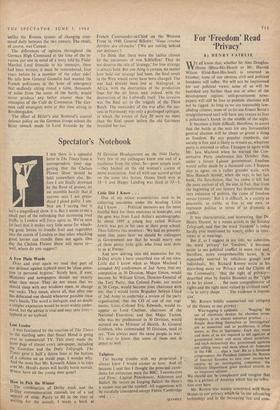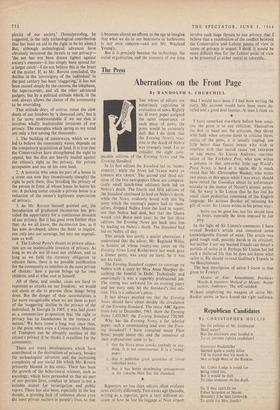For 'Freedom' Read `Privacy'
By. HENRY FAIRLIE WE all know that, whether Sir Alec Douglas.. Home (Bless-His-Heart) or Mr. Harold Wilson (God-Rest-His-Soul) is returned in October, none of our obvious civil and political freedoms will suffer. We will not be imprisoned for our political views; none of us will be banished any further than one or other of the development regions; anti-government news- papers will still be free to publish; elections will not be rigged. As long as we are reasonably law- abiding citizens, none of us (to use Ernest Bevin's straightforward test) will have any reason to fear a policeman's knock in the middle of the night.
It becomes a little difficult, therefore, to assert that the battle at the next (or any foreseeable) general election will be about so grand a thing as freedom. By any popular standards, our society is free and is likely to remain so, whatever party is returned to office. I happen to agree with Mr. lain Macleod when he warned the Con- servative Party conference last October that, under a future Labour government, freedom would suffer death by a thousand cuts. 1 happen also to agree, on a rather grander scale, with Miss Hannah Arendt, when she says, in her last book, On Revolution, that `no cause is left but the most ancient of all, the one, in fact, that from the beginning of our history has determined the very existence of politics, the cause of freedom versus tyranny.' But it is difficult, in a society as peaceable, as stable, as free as our own, to represent politics in terms of so dramatic a conflict.
It was characteristic, and interesting, that Dr. Henry Durant, in a recent article in the Sunday Telegraph, said that the word 'freedom' is today hardly ever mentioned by voters, either in inter- views or at meetings.
But if, as I suggest in my title, we substitute the word 'privacy' for 'freedom,' it becomes easier to see political conflict in more real and, therefore, more Comprehensible terms. 'It is repeatedly asserted by solicitous groups and individuals,' Mr. Richard Rovere wrote in his disturbing essay on 'Privacy and the Claims of the Community,' that the right of privacy— described once by Justice Brandeis as the "right to be let alone . . . the most comprehensive of rights and the right most valued by civilised men" —is in sorry shape. . . . The evidence is impres- sive'.
Mr. Rovere boldly summarised one category of the threats to our privacy:
Wire-tapping is epidemic. . . . 'Bugging.' the use of electronic devices by absentee eaves- droppers, is an almost universal practice. . . . People describing themselves as 'investigators' are as numerous and as pestiferous, it often seems, as flies in September. Each day, more and more of us are required to tell agencies of government more and more about ourselves; and each melancholy day, government agencies are telling more and more about us. Someone in the. FBI . . . slips a 'raw' file to a favoured congressman; the President instructs the Bureau of internal Revenue to, turn over income-tax returns to an investigating committee; the Defence Department gives medical records to an insurance adjuster.... We should not be complacent and imagine that this is a picture of America which has no reflec- tion over here.
Mr. Rovere was mainly concerned with those threats to our privacy which lie 'in our advancing technology and in the increasing size and com- plexity of our society.' (Soundproofing, he suggested, is the only technological contribution that has been an aid to the right to be let alone.) But, although technological advances have obviously increased the threats to our privacy— 'the net has not been drawn tighter against society's enemies—it has simply been spread for a larger catch'—I do not believe this is the heart of the matter. If, as Mr. Rovere concluded, the decline in the 'sovereignty of the individual' in the past century has been 'staggering,' it has not been caused simply by the camera, the telephone, the tape-recorder, and all the other advanced gadgets, but by a political attitude which, in the end, always allows the claims of the community to be overriding.
This attitude does, of course, mean the slow death of our freedom by 'a thousand cuts,' but it is far more understandable if we see that it involves wholly inadmissible invasions of our privacy. The examples which spring to my mind are only a few among the thousands: 1. The building of motorways, which we are led to believe the community wants, depends on the compulsory acquisition of land. It is true that the Conservatives have strengthened the right to appeal, but the dice are heavily loaded against the citizen's right to the privacy, the private occupation and use of his own land.
2. A motorist who owns no part of a house in a street can now buy (monstrously cheaply) the right to park there, thus invading the privacy of the person in front of whose house he leaves his car. A parking meter outside a private house is a reduction of the owner's legitimate expectation of privacy.
3. As Mr.. Rovere himself pointed out, the introduction of graduated income-tax has pro- vided the opportunity for a continuous invasion of our privacy. But it has gone even further than that. As we all know, the income-tax law, as it has now developed, allows the State to inquire, not only into our earnings, but into our expendi- ture as well.
4. The Labour Party's threats to private educa- tion are an inadmissible invasion of privacy. As long as we do not ill-treat our children, and as long as we fulfil the statutory obligation to educate them, there is no possible justification for the community to interfere in the most private of choices: how a parent brings up his own children, and at what cost to himself.
All of these, and similar, cases are hard to represent as attacks on our freedom: we would not shoot or die to prevent these things being done. But the danger of their accumulation is far more recognisable when we see them as part of the 'staggering' decline in the privacy of the individual. In Georgia in 1905, it was laid clown as a common-law proposition that 'the right to privacy has its foundations in the instincts of nature.' We have come a long way since then, to the point when even a Conservative Minister of Transport can be abruptly careless of the citizen's privacy if he thinks it expedient for the community.
There are many developments which have contributed to the destruction of privacy, besides the technological advances and the increasing complexity of our social life which Mr. Rovere primarily blamed in his essay. There has been the growth of the behavioural sciences, such as sociology, which have persuaded us that no part of our private lives, conduct or leisure is not a suitable matter for investigation and public report. There has also been, especially in the last decade, a growing lack of reticence about even the most private matters in people's lives, so that it becomes almost an affront to the age to imagine that what we do in our bedrooms or bathrooms is our own concern—and not Mr. Wayland Young's.
But it is precisely because the technology, the social organisation and the manners of our time involve such huge threats to our privacy that I believe that a redefinition of the conflict between the Conservative and Labour points of view in terms of privacy is urgent. I think it would be more difficult then for the Labour point of view to be presented as either moral or tolerable.







































 Previous page
Previous page